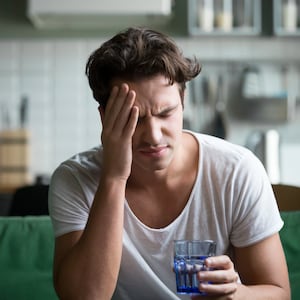Health
Understanding the Two-Day Hangover: Causes and Recovery Tips

The phenomenon of the two-day hangover is increasingly acknowledged among individuals in their thirties and beyond. As people age, the ability to recover from excessive alcohol consumption seems to diminish, leading to prolonged periods of discomfort. Reports reveal that symptoms can last from a few hours to several days, leaving many to wonder how to expedite recovery.
A recent personal account highlights this issue. At 36 years old, the author reflects on how, until the age of 32, recovery from a night of heavy drinking was relatively swift. A nap, hydration, and a nourishing meal would typically restore balance. However, circumstances changed following a wedding last year, where an overindulgence in cocktails and espresso martinis resulted in a range of unpleasant symptoms. The aftermath included stomach jitters, anxiety, and a lingering feeling of malaise that persisted for approximately 48 hours, with the author noting that a full week was needed to feel normal again.
The struggle is not unique. Many individuals in their thirties, forties, and older experience what has been termed the “two-day hangover.” This condition can manifest as a combination of headaches, nausea, and emotional distress that can overshadow the joy of social events.
Research on Extended Hangover Symptoms
Scientific literature supports these observations. A notable case documented in the medical journal The Lancet detailed the longest verified hangover, experienced by a 37-year-old man from Glasgow. Following an excessive drinking spree that included consuming 60 pints of beer over four days, the individual reported a blurred vision and persistent dull headache that lasted for more than a month. This extreme situation underscores the potential severity and duration of hangover symptoms for some individuals.
Age-related physiological changes likely play a significant role in how the body processes alcohol. As individuals grow older, the liver may become less efficient at metabolizing alcohol, resulting in heightened sensitivity to its effects. Additionally, dehydration and electrolyte imbalances can exacerbate feelings of discomfort, making recovery more challenging.
Strategies for Quick Recovery
While there is no one-size-fits-all solution for hangovers, several strategies may help alleviate symptoms. Staying hydrated is crucial; drinking water before, during, and after alcohol consumption can mitigate dehydration effects. Consuming foods rich in vitamins and minerals, such as fruits and vegetables, can aid in replenishing nutrients lost during drinking.
Rest is also essential. Quality sleep allows the body to recover and heal, while light physical activity may help stimulate endorphins, potentially improving mood. Some individuals find relief through over-the-counter medications to address specific symptoms, although caution is advised, particularly regarding the use of pain relievers that can further irritate the stomach.
Understanding the realities of hangover recovery is vital, especially as social occasions become more frequent. Awareness of personal limits and taking preventative measures can make a significant difference in how one feels the day after a celebration. As more people share their experiences, it becomes clear that the two-day hangover is a significant concern that deserves attention and practical strategies for recovery.
-

 World2 weeks ago
World2 weeks agoPrivate Funeral Held for Dean Field and His Three Children
-

 Top Stories3 weeks ago
Top Stories3 weeks agoFuneral Planned for Field Siblings After Tragic House Fire
-

 Sports3 months ago
Sports3 months agoNetball New Zealand Stands Down Dame Noeline Taurua for Series
-

 Entertainment3 months ago
Entertainment3 months agoTributes Pour In for Lachlan Rofe, Reality Star, Dead at 47
-

 Entertainment2 months ago
Entertainment2 months agoNew ‘Maverick’ Chaser Joins Beat the Chasers Season Finale
-

 Sports3 months ago
Sports3 months agoSilver Ferns Legend Laura Langman Criticizes Team’s Attitude
-

 Sports1 month ago
Sports1 month agoEli Katoa Rushed to Hospital After Sideline Incident During Match
-

 World3 weeks ago
World3 weeks agoInvestigation Underway in Tragic Sanson House Fire Involving Family
-

 Politics2 months ago
Politics2 months agoNetball NZ Calls for Respect Amid Dame Taurua’s Standoff
-

 Top Stories3 weeks ago
Top Stories3 weeks agoShock and Grief Follow Tragic Family Deaths in New Zealand
-

 Entertainment3 months ago
Entertainment3 months agoKhloe Kardashian Embraces Innovative Stem Cell Therapy in Mexico
-

 World4 months ago
World4 months agoPolice Arrest Multiple Individuals During Funeral for Zain Taikato-Fox









